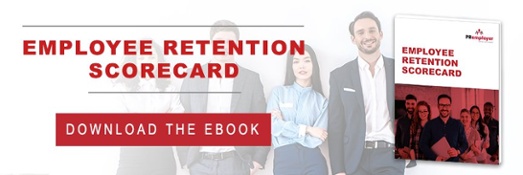
Employee engagement is a hot topic among business owners and HR professionals for good reason. Engaged employees tend to be more productive, deliver higher-quality work, and are more likely to stay with a company long-term.

Talent retention and productivity are paramount, and improving employee engagement can be the game-changer your company needs.
In this blog post, we will explore ten actionable strategies to boost employee engagement, providing practical tips and insights.
Tips to Improve Employee Engagement
Let’s go over ten tips to improve your overall employee engagement!

1. Provide Professional Development Opportunities
Investing in professional development is one of the most effective ways to engage employees. Offering training programs, workshops, and courses enables your team to enhance their skills and achieve their career goals.
Employees who have opportunities for growth and development are more satisfied and committed to their jobs. Professional development benefits the employees and brings new skills and ideas to the organization.
Regularly evaluate the skills needed for your business and create a roadmap for each employee's development with in-house training, online courses, or attending industry conferences. You'll foster a culture of continuous learning and improvement by showing a commitment to their growth.
2. Create a Positive Work Environment
A positive work environment is essential for fostering engagement. Promote a workplace culture that values diversity, inclusion, and respect. Transparent communication channels between management and staff can significantly enhance trust and collaboration and improve employee experiences.
Start by implementing policies that support diversity and inclusion. Encourage open dialogue and ensure that everyone's voice is heard, regardless of their position within the company.
Additionally, the physical environment plays a crucial role in how employees feel. Ensure the office is clean, well-lit, and designed to promote collaboration. Comfortable workspaces can significantly impact an employee's daily experience, leading to higher engagement levels.
3. Recognize and Reward Achievements
Recognition is a powerful motivator. Implement a system that acknowledges and rewards employees for their contributions and hard work. This can be as simple as a shout-out during team meetings or as elaborate as an annual awards ceremony.
Employees who feel recognized and appreciated are likelier to be engaged and motivated. Recognition can take many forms, including verbal praise, written notes, or public acknowledgment.
Consider creating a formal recognition program that includes both individual and team achievements. This will boost morale and foster a sense of camaraderie and teamwork within your organization.

4. Encourage Work-Life Balance
Work-life balance is critical for employee engagement. To help employees balance their personal and professional lives, offer flexible working hours and remote work options.
Flexible work arrangements can reduce stress and burnout, leading to happier and more productive employees. Providing options such as telecommuting, compressed workweeks, or flexible start and end times can make a significant difference.
Encourage your team to take breaks and use their vacation time. A well-rested employee is more likely to be engaged and energetic. By promoting a healthy work-life balance, you can show that you value their well-being.
5. Conduct Regular Employee Surveys
Employee surveys are an invaluable tool for gauging satisfaction and identifying areas for improvement. Conduct regular surveys to gather feedback and understand your team's needs and concerns.
Surveys can reveal insights into what motivates your employees, what challenges they face, and how they perceive the company's culture. Use this data to make informed decisions and implement changes to enhance engagement.
Ensure the survey results are shared with the team, and their feedback is taken seriously. Transparency and action based on their input will build trust and show that you are committed to their well-being.
6. Promote Health and Wellness
Wellness programs that support physical, mental, and emotional well-being are essential for a healthy and engaged workforce. Offer initiatives such as fitness classes, mental health resources, and wellness challenges.
Encouraging a healthy lifestyle can reduce absenteeism, increase productivity, and improve employee satisfaction. You could take this further by offering gym memberships, healthy snacks, and mindfulness workshops.
Make wellness a part of your company culture by organizing team activities that promote health and well-being. A holistic approach to wellness can have a profound impact on employee engagement.

7. Offer Competitive Compensation and Benefits
Ensure that your compensation and benefits packages are fair and competitive. Employees who feel adequately compensated are likelier to be engaged and committed to their jobs.
Research industry standards and regularly review your compensation packages to ensure they are competitive. Benefits such as health insurance, retirement plans, and paid time off can significantly impact employee satisfaction.
Consider offering additional perks like tuition reimbursement, childcare assistance, or wellness stipends. These benefits can set you apart from competitors and show that you value your employees' well-being.
8. Provide Meaningful Work
Employees want to feel that their work is meaningful and contributes to the organization's mission. Ensure that job roles are enriching and aligned with the company's goals.
Communicate the bigger picture and how each employee's work fits into it. Help them understand the impact of their contributions and how they are making a difference.
Encourage employees to take ownership of their projects and provide opportunities for them to innovate and lead. Meaningful work can significantly enhance engagement and motivation.
9. Invest in Modern Tools and Technologies
Equip employees with the necessary tools and technology to perform their jobs effectively and efficiently. Investing in modern tools can streamline processes and reduce frustration.
Evaluate the tools and technologies your team uses and identify areas for improvement. Implementing user-friendly software and up-to-date equipment can enhance productivity and engagement.
Provide training and support to ensure employees can effectively use the new tools. A well-equipped workforce is more likely to be engaged and produce high-quality work.

10. Implement Regular Feedback Mechanisms
Regular feedback is crucial for employee growth and development. Implement mechanisms for providing constructive feedback regularly.
Create a culture of continuous feedback where employees feel comfortable giving and receiving feedback. This can include one-on-one meetings, performance reviews, and peer feedback.
Constructive feedback helps employees understand their strengths and areas for improvement. It also shows that you are invested in their development and success.
Bonus Tip! Partner with a PEO for Enhanced Engagement
Partnering with a Professional Employer Organization (PEO) can help your company handle HR processes, provide better benefits, and streamline costs. PEOs offer guidance and expertise to improve employee engagement.
A PEO can manage administrative tasks such as payroll, benefits administration, and regulatory compliance, allowing you to focus on strategic initiatives that drive engagement.
By offering access to better benefits and HR support, a PEO can enhance your company's ability to attract and retain top talent. Consider partnering with a PEO to take your employee engagement efforts to the next level.
Improving employee engagement is a multifaceted effort that requires a combination of strategies. By prioritizing engagement, you can drive productivity, retain top talent, and create a thriving workplace culture.

